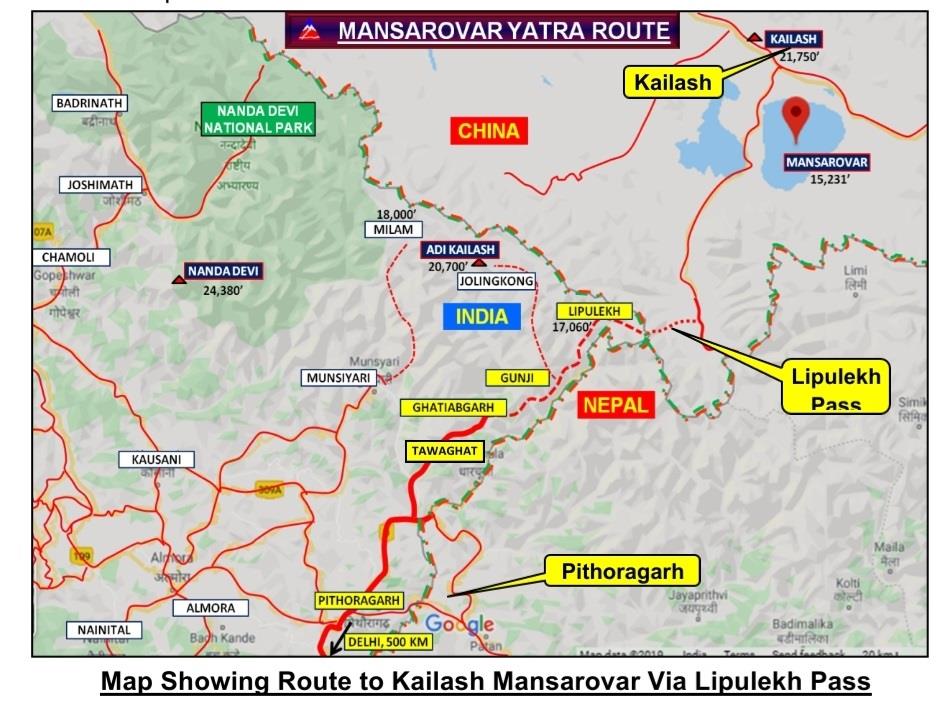By Seymur Mammadov

India and Nepal, having common borders, did not always have the highest friendly relations during the time of gaining independence by both countries. One of the long-standing disputes is related to the Kalapani border region.
The unresolved border issue between the two Asian countries can not only seriously harm bilateral ties, but can also lead to an escalation of the conflict.
This assumption is supported by the fact that India’s opening of a road link via Lipulekh last week, which is considered disputed territory between India and Nepal, provoked a strong reaction both from the side of the Nepalese people and from the authorities of Nepal.
As a result of the ill-conceived actions of New Delhi, official Kathmandu was forced to create a border post near Kalapani.
Frankly, Nepal did not expect such a turn of events in bilateral relations, because before the discovery of this road, in April, India sent 23 tons of essential drugs to Nepal to help him fight the coronavirus pandemic (COVID-19). After this help, India decides to open the road to the disputed territory, knowing full well that this can cause a negative reaction from the authorities of Nepal.
We are witnessing a decline in the level of relations between India and countries to which China gives the highest priority in its foreign policy.
The reaction of the Nepalese authorities, of course, was not long in coming. According to the Ministry of Foreign Affairs of Nepal, Foreign Minister Pradeep Kumar Gyawali handed a diplomatic note to Ambassador Vinay Mohan Kwatra on Monday (May 11, 2020) at his office, expressing dissatisfaction with the construction of a road link through Lipulekh.
“Foreign Minister Pradeep Gyawali conveyed the government of Nepal’s position on boundary issues to Ambassador of India to Nepal Vinay Mohan Kwatra at a meeting held at the Foreign Ministry today and handed over a diplomatic note in this regard,” read a short note issued by the ministry. Similarly, the Nepali embassy in New Delhi also submitted a copy of the note to India’s Ministry of External Affairs.
Today, India has traditionally strained relations with Pakistan and China. Recently, relations between China and India have again escalated. In addition, Indo-Malaysian relations are not experiencing the best period, and relations between India and Iran have rolled back after the cessation of imports of Iranian oil due to US sanctions.
What do we see in the end?
We are witnessing a decline in the level of relations between India and countries to which China gives the highest priority in its foreign policy.
There is an explanation for this – American pressure on China. India does not want to spoil relations with the United States, which are conducting an open trade, technological war against China.
India made concessions to the Americans in stopping the import of Iranian oil, but not on the issue of strategic security – the New Delhi is looking forward to supplying Russian S-400 missile systems in order to achieve an Asian balance of power. The concern of the Indian side can be understood because these missile systems are already in service with China, and the S-400 test firing on Chinese territory was successful.
On the other hand, why a multi-billion dollar India with huge military potential to spoil relations with the small country like Nepal with a population of 30 million people?
Why is for India so important road link via Lipulekh?
During the Sino-Indian War of 1962, India deployed security forces on disputed territory. Kalapani was considered a “safe zone” for the deployment of Indian troops, since its high height (6180 meters) allowed India to effectively fight back from Chinese attacks. The Lipulekh Pass is the most flexible and shortest route by which you can get to Taklakot, the Tibetan town of China, which enables India to observe Kalapani.
Therefore, it is not surprising that India is trying to consolidate its influence in the political establishment of Nepal, to gain the support and trust of Nepalese officials. India has made major investments in road construction and other infrastructure projects, hydropower projects, tourism and agriculture, as part of the bilateral Investment Promotion and Protection Agreement (BIPPA), signed in 2011.
India’s interest in Nepal grew even more after the Kathmandu signed the Intergovernmental Memorandum of Understanding on cooperation within “One Belt, One Road” in May 2017 with China, which opened up even wider prospects for the development of relations between the two countries. China is currently Nepal’s first largest investor and second-largest trading partner.
After Nepal joined the Chinese initiative, India began to take steps that irritated Nepal. For example, last year in November, New Delhi published a new map that showed Kalapani within its borders, which provoked a protest from the Nepalese. And now today is the story of the opening of the road link through Lipulekh.
Of course, a border dispute, conflicts between the two sides arose earlier, before Nepal joined the Chinese initiative.
For example, in 1989, India unilaterally closed 22 border crossing points and 15 transit points for Nepal. This border blockade was a blow to the then nascent Indo-Nepalese bilateral relations. The story of the blockade continued.
In 2015, a second blockade occurred between the countries. India imposed a five-month blockade on the grounds that the Nepalese parliament was not ready to adopt the “Indian written constitution” and wanted to emerge as a sovereign and independent state.
China extended a helping hand, a friendship hand to Nepal, knowing what serious problems this landlocked country faced. Today, the Nepali border town of Rasuwa Gadi on the Bhote Kosi River daily receives dozens of trucks carrying Chinese goods.
There were also problems between China and Nepal, especially Mount Everest. But in 1960, Nepal and China signed a border agreement after a big dispute and settled this matter. The then Prime Minister of China, Zhou Enlai, declared in 1960 that “Mount Everest belongs to Nepal.” From that moment, the border problems between the northern neighbor and Nepal became more stable and peaceful, which enabled them to develop relations in the field of trade and other industries.
Now today, the relations of these countries have reached a higher level due to the solution of the border problem – Nepal today is an integral part of the «One Belt, One Road”. The only solution to the stable and sustainable development of Indo-Nepalese relations is to resolve the border dispute. Is India ready to solve this problem through negotiations? The question is rhetorical.

